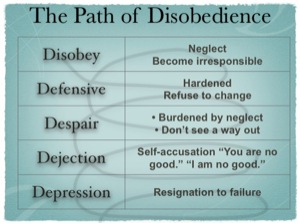
Overcoming Depression: Lesson #9
Adopting God's Hope
Discipleship Level 2: Reaching Beyond Mediocrity
Rev. Paul J. Bucknell
Depression in the News | Obtaining Hope | Emotions, Feelings and Depression
Gaining Discernment | Root Cause| The Path (5Ds)
Hope Through Obedience | A Strong Shield | Rebuild Foundation
Deeper Trust | Two Truths | Deliverance Cycle
![]()
Exercises#1-5 | Handout | Video Podcast | D2 Index | RSS
![]()
The 5 Ds: The Path of Disobedience
The 5 Ds: The Path of Disobedience is part 6 of 12 that shows how a depression cycle progresses from bad to worse. Hope comes from recognizing each stage and how to handle its temptation. 'Adopting God's Hope, Overcoming Depression' is the ninth lesson in a series on "Reaching Beyond Mediocrity."
![]()
Disobey
Disobedience leads to personal problems.3 When a person neglects something or does something he shouldn't, guilt enters the picture.  Remember that even though this is identified as one point, it is probably better to see it not as an isolated event but as a series of repetitive acts of disobedience.
Remember that even though this is identified as one point, it is probably better to see it not as an isolated event but as a series of repetitive acts of disobedience.
This event might not be easily identifiable. Sometimes it is as easy as seeing the way you neglect your quiet time with the Lord, don't care for kids, insensitive to spouse, etc. Perhaps the original point of disobedience is elusive, but if one has gone down the downward cycle, then one can isolate numerous points of disobedience. 4 Work with what one can see. It is much easier.
Once disobedience is discovered, then we know the way out. Obedience is the path out. Disobedience will further pull one down.
Defensive
With sin, there is guilt. One has to deal with sin one way or the other. The best way is to confess and find forgiveness and restoration through Christ.
"But if we walk in the light as He Himself is in the light, we have fellowship with one another, and the blood of Jesus His Son cleanses us from all sin." (1 John 1:7).
If we choose (notice this word that indicates volition) not to admit our fault and restore things, then we are left only with hardening our hearts. We become more hardened and become even less willing to accept fault and change. Perhaps before we contemplated changing, but with further hardening, we are even less open to the idea. At this time we become active players in the blame game.
We are further agitated and easily blame others rather than focusing on our part of the problem. Criticism is where one enters another declining cycle. The initial disobedience is covered up. How convenient for the guilty person! Criticism, if joined with a lack of sympathy for or understanding of the criticized, usually points to a hardened heart and one's own unconfessed sin.
Cobwebs are abandoned spider webs that have caught dust. Spiders keep active webs clean by regularly cleaning them and keeping them invisible. We need to keep our souls clean and confess our sins.
Despair
By this time we have probably disobeyed the Lord even more. In either case, we begin to feel burdened down by two things.
(1) Neglect
By neglecting caring for our responsibilities, whether it is laundry piles, undone assignments, lack of attention to one's spouse, etc., the consequences pile up. Relationships get sour. Life gets very unpleasant. This only makes one feel worse!
(2) Overwhelmed - no way out
Along with these consequences comes the inability to see through the situation. If earlier on one had looked at the problem, it would have been easy. Just do a load of laundry. But no longer. Things have piled up. There is has been blaming others and built up resentment. Now there is no easy solution.
This is perhaps the beginning point of depression. A person has begun to despair and think about giving up. The situation is too overwhelming. This is where stress comes in. A person puts everything on hold. He or she doesn't know how to go forward. He is stuck.
We want to distinguish this step from the next stage where one actually gives in. Despair is where one merely feels overwhelmed with the circumstances, dejection is where one resigns him or herself into a state of failure.
Dejection
While despair focuses on the circumstances, dejection focuses on one's personal inability to cope with the situation.
Words of Doom
- "Give in."
- "Give up."
- "You are a failure."
- "You are just fooling yourself."
- "You will never succeed."
"You are a fool."his is where Satan uses his master skills in 'accusation' to emphasize the inferiority and failures of a person. He so strongly emphasizes his message that the person starts repeating it to himself. Satan says, "You are no good." The person blindly responds, "I am no good." As mentioned above, one does not want to conclude these things, but after staring at the problem, feelings of despair overhanging one's mind and Satan's accusations, it seems the logical step to take.
 Dejection describes how a person moved from being overwhelmed with neglecting doing what was right (despair) with concluding oneself as a failure (dejection).
Dejection describes how a person moved from being overwhelmed with neglecting doing what was right (despair) with concluding oneself as a failure (dejection).
The truth is that the person has done wrong. He has blamed others. He has repeatedly hardened his heart against God. Satan, The Accuser (Revelation 12:10), goes a step further, however, in his accusation.
He is not only saying the person has done wrong (which is true) but convinces the person that he can do no other thing but stay on that same path of defeat. "If you can't be faithful to your wife, then that is the way you are. You may as well just give in and admit your failure."
This line of thought is something the Holy Spirit, the exhorter, would never do. The Spirit shows a way out. The Holy Spirit would come alongside a believer and show that one's failure is due to one's sin, and that he can repent and find restoration.
The evil one convinces a person that he can never get out. This is where the spirit of dejection comes in. His feelings trump any proper thinking and pull him down into his despondency. This leads to the last stage.
Depression
There are many stages of depression. We do not really care to spend time distinguishing them. They differ on their severity. The severity is resultant to how many times they have gone through these sub-cycles being described. Our point is to clarify the actual stages that occur to reach this stage of depression and what goes on at each stage.
Depression in the modern sense is best described as a resignation of defeat. (Be careful not to conclude that all problems are because of disobedience (e.g. Job)). The light of hope has been extinguished. Yes, there are different levels of depression, and so at some levels there still shines a bit of light. But with each ensuing stage, more of that light is taken away. Hope, layer after layer, is stripped away by the lack of belief that anything can be done.
A person then becomes less and less convinced that they are able to cope with some situation. Normally, a person would be able to cope with some basic tasks of life such as cooking, parental care, etc., but severe depression cripples even these basic tasks.
The steps to reach the last point can be complicated and hard to detect, but the signs of resignation, the look of despair, the spirit of giving up all come in and make it appear that it is the king of problems. All of a sudden, it seems that the wife can't cook, have sex, care for others or even carry out normal parenting duties.
Sometimes it seems like this spirit of resignation or giving up just drops in. In fact, as seen in these repeated cycles, depression does not just occur. There are reasons a person has given up hope and it usually is because there is no longer any hope (lack of confidence) that he or she will be able to cope with this situation.
This person is usually physically able to work but no longer has the spirit to work. She has given up hope that she can get over this problem. And so, step by step, the problem of her inadequacy are exacerbated to the point she just agrees with the haunting thoughts that she is a failure. Of course, stories about others who have slid into depression and never really come out of it can make things even worse. Satan uses all these things to pound the nails into the coffin of depression.
She now has lost motivation to go on with life. Actually, she has been tempted to think this way for a while, but she put those thoughts aside, doing what she could. But now she believes she is a failure and cannot improve. This is the spirit of resignation, the spirit of depression.
Summary
Before going on, we need to understand that a person never really fully gives in. It will not seem that way in some circumstances. The human will, though, always has a powerful reserve of energy. Given the right circumstances, the person could by God's grace step out of depression.
A Personal Testimony
I remember as clear as day one case of serious depression. The wife had lost all ability to rightly respond to husband, relatives, children or pastor (me). The government workers exacerbated things by coaching her to blame her husband (he had his share of problems) and helped her try to get divorced. This built up further inner struggles. In the end she was in a psychiatric ward responding to no one. The psychiatrists tried all their magic drugs, but she was listless and not speaking. She was about to be sent off to long term psychiatric housing in two days. I could do no more. Neither could the psychiatrists.
During one afternoon I was meditating on God's Word, the Lord brought two verses to my mind to tell her. I felt awkward speaking one of those verses but I was obedient. When I did, God began the greatest transformation that I had ever seen. Literally, before my eyes her facial features began to soften and her heart tender. For a good while I just watched all those tears and weeping noises. In the end, I led her to repent. I called her husband. They were immediately reconciled. She was out of the hospital in one or two days and back home.
I share this real story just to remind you that there is always hope. Don't give up on yourself or others. Man is made in God's image and so, as long as he lives, has a will independent of the circumstances. Usually the circumstances shape his mind and feelings and guide him along. Satan, however, cannot fully bind a person to the point that he cannot make a decision to trust God. This is why deceit is so important to the evil one. He needs to keep making it so the person does not gain any hope and if he does, quickly disperse it.
Satan can blind, but he cannot stop the human will unless the life is taken. That is the reason he instigates suicide. Men are less likely to show their depressive state, perhaps because of their pride. But they are much more likely to commit suicide.
Sometimes it is hard to see how to practically handle depression. Let us look at how one person combatted depression. -> Next










